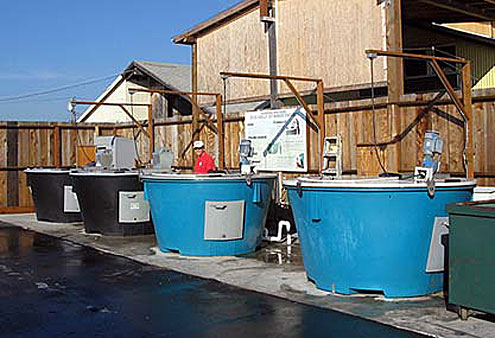By C.J.

Don Baker who orchestrates the system at 2710 Chanticleer Avenue could use a hand with the turning of the tubs. It’s a simple enough process that takes little time and sincere commitment from a few people. Done in the morning, it’s about a 30-minute time frame. Volunteers are welcome to sign up for one session a week or all three. It’s a perfect match for those who want to contribute to a big and purposeful project but have a small amount of time on their schedule.
There’s a lot of balancing that happens in this process. A tub full of broccoli has a different speed and fragrance on it’s way to completion than a one full of potatoes! Acquired to turn food scraps from the lunch program on site and scraps from the popular Brown Bag Program each tub produces between 1000 to 15000 pounds within a cycle of between six to twelve weeks.
The Composting Operation is actually the third (1+1+1) step in the sustainable and ecological mission of Grey Bears. First, Tony Alonzo leads the receiving department getting things in place. Ciro Milazzo, an active octogenarian with the program, recalls the students at UCSC beginning the gleaning process with local farms in the early 70’s.
Milazzo and Alonzo joined in with crews of 10 to 30 people head out to the agricultural areas in a van towing a port-a-potty complete with sink and soap! Most of the receiving was from gleaning. By the time the millennium was being celebrated Cal Recycle awarded a generous grant to Grey Bears to continue the program.
Brown Bag Program Coordinator, Dave Fuentez is appreciative of the collaboration of farmers and volunteers with the second step, distribution. Having begun as a delivery driver in 1973 he’s worked in the community and knows what it takes to keep things moving.
Volunteers like retired university employee Louise divvy out the product for the lunch kitchen and the Brown Bag Program assuring good food reaches happy appetites while damaged goods are sent to compost. The generosity of local food suppliers and the labor of kind volunteers have kept this program alive and well. Fortunately, Toni Becerril manages a sterile and efficient warehouse so the sorting is comfortable and efficient.
The Bears also have a worm composting demonstration area behind the main office. Interested in setting up your own home recycling with worms, or would like some of our worms to get started? Vermiculture expert, Paul McGillicuddy is here every Friday from 10-11am and available at teacherpaul10@gmail.com.
1) You can join the party. 2) Simply stop by one morning and meet Don Baker or 3) Telephone 479 1055 and tell Michelle, the volunteer coordinator, that you are ready! I hope to see you on my shift!